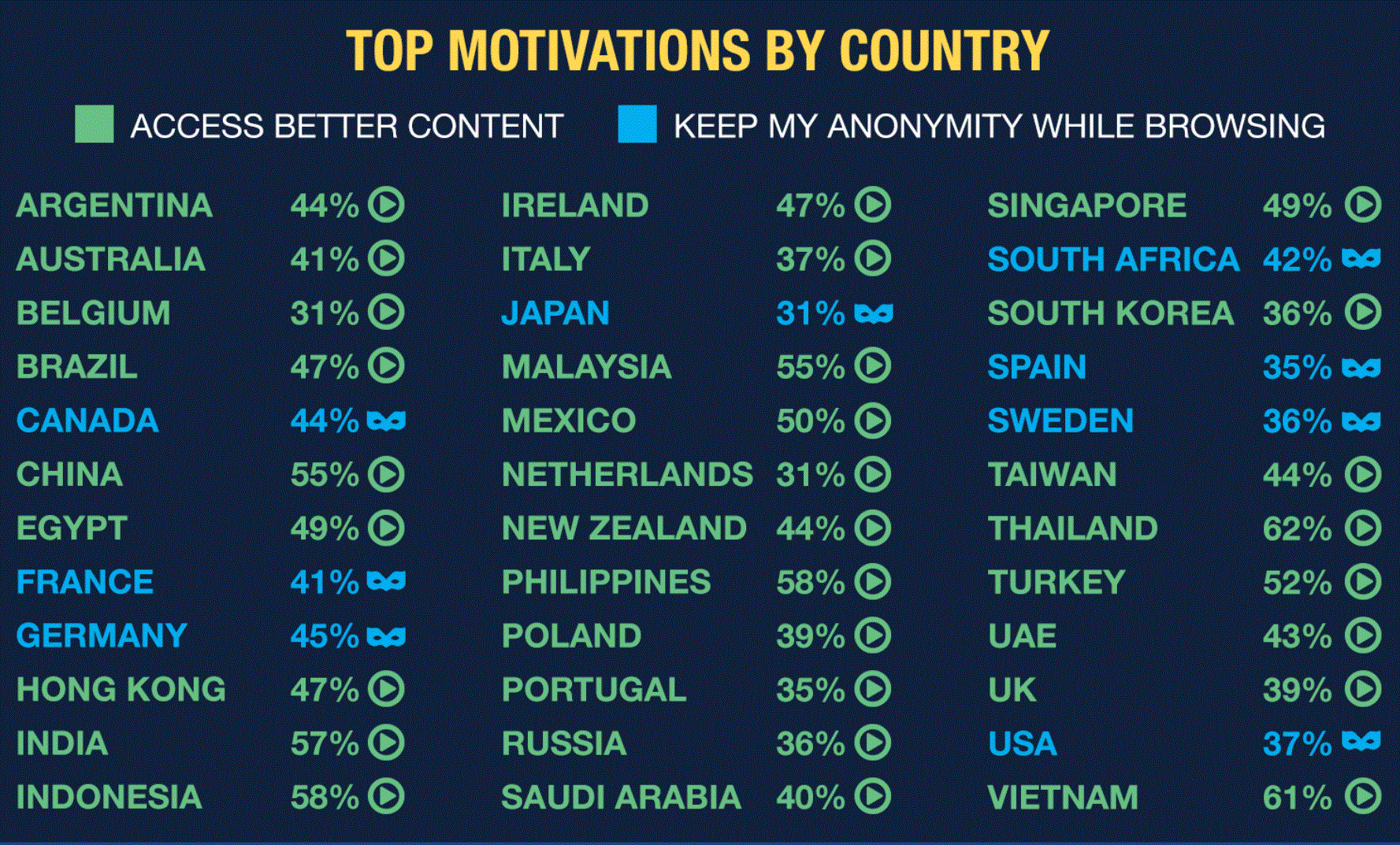
There are a variety of reasons why an individual may use a Virtual Private Network, more commonly known as a VPN. Due to the increased risk of cyber attacks in recent years, people are more likely than ever to be concerned about their privacy when browsing on the internet. This is one of the most common reasons why people may be more inclined to use a VPN in 2019, as using a VPN grants you with a new IP address, however there will be more on this later in the article. There are other reasons why someone might want to use a VPN though, such as in order to access multi media content that was previously unavailable in their region, or in order to maintain anonymity whilst browsing on the internet.

As you can see from the infographic [adjacent] in the following month, 25% of users have used a VPN in the past month, and you can see a breakdown of the devices they were used on. The most common device to use a VPN on is a desktop PC, with the most common use being to access better entertainment content. As mentioned previously, a VPN can be used to unlock multi media content that was previously geographically locked to a certain region, such as the BBC iPlayer, or the different variation of Netflix, which may be more desirable. A VPN works by diverting your internet traffic through an external server, which is located in sometimes a different country, or even continent.
Of these 25%, according to Best vpn UK, a further 42% of individuals who use VPNs on their mobile phones said that they use them every day or nearly everyday, with 35% of computer users saying the same. As you can see, a number of users on both devices use the service less frequently, with 14-15% across both devices using a VPN less than once a month.
The infographic also displays the countries where VPNs are most popular. Indonesia and India are the most popular market for VPN usage, with 38% of individuals in these countries saying that they use the service. In Turkey, 32% of internet users say that they use VPNs, with 31% usage rates in China, and 29% in both Malaysia and Saudi Arabia. As mentioned previously, half of the individuals who use VPNs said that their main reason for doing so was to increase the entertainment choices that were available to them, with 34% suggesting that they use VPNs in order to access social media networks that may be restricted within their country. 31% said that they use a VPN in order to maintain anonymity when browsing the internet, with only 18% suggesting that they use a VPN to hide their browsing activity from the government.
Motivation by country
You can also see the top motivation for VPN usage broken down by country. Interestingly, the main reason for VPN usage in the majority of countries is to access better multi media content, with just 8 countries, such as Canada, France, Germany and the USA having anonymity whilst browsing as their main motivation for VPN usage.

The infographic also displays the statistic suggesting that VPN users are big consumers of online TV. 40% of users are thought to be consumers of online television, who are likely to be paying subscription services weekly. This also helps to dispel the image that everyone who uses a VPN is a pirate, and doesn’t pay for any of their multi media content. In fact, 77% of VPN users are thought to be purchasing digital content each month.
25% of VPN users are using the service in order to communicate with family and friends abroad. For example, Facebook messenger is one of the most popular way to maintain contact with friends and family when abroad, as it is easy to access when connected to Wi-Fi, and mobile internet data may be limited; however, in China Facebook and Facebook messenger are both banned. This is easy to bypass by installing a VPN service on your phone, and in fact, both Apple and Android phones now come with the software already built in. Facebook messenger is not the only messaging app that is blocked in certain countries, Gmail, Instagram and Twitter are also blocked, meaning without a VPN communication with friends and family may be difficult.
Another reason why individuals may use a VPN is to protect their freedom of speech. Within the top users of VPNs in the world, many of them are middle eastern countries, such as Saudi Arabia. In this part of the world, many people need to use self-censorship in order to avoid any legal trouble, as freedom of speech is more complicated than in the western world. Online bloggers will use VPNs in order to stop their connections from being snooped on. The laws surrounding free speech are not necessarily in place to reduce freedom of speech, but to make individuals feel safer online. However, the lines around them are blurred, and often abused by certain governments, resulting in a restriction of free speech on the internet. A VPN will use a complex mathematical formula to encrypt your personal data and online traffic, making it virtually impossible for anyone to decipher. This will help to protect your online habits, and as mentioned earlier, the newly generate IP address will make it impossible for anyone to link what you say or do on the internet with your location, or real identity.
Overall, there are a variety of reasons why an individual may use a VPN. From accessing better multi media content, to protecting themselves from any potential data breaches, or to access social media networks which may be blocked certain countries. A VPN will be able to unlock a whole new experience in regards to internet browsing.

To read more on topics like this, check out the technology category.
